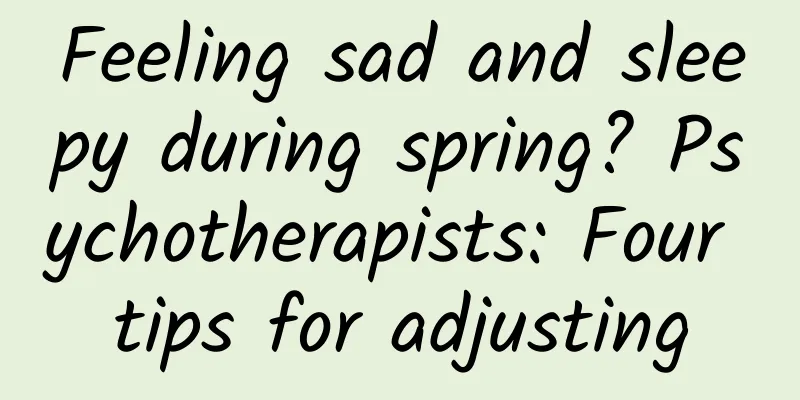Feeling sad and sleepy during spring? Psychotherapists: Four tips for adjusting

|
The spring breeze blows gently, and everything comes back to life. However, in this beautiful season, some people feel tired, depressed, and even suffer from "spring sleepiness" and "spring sadness". Liu Huayang, head of the Quanzhou Psychological Assistance Hotline Center and a national intermediate psychotherapist, reminds us that these symptoms are not just physical reactions, but may also be closely related to mental health. Sadness of Spring: Symptoms of seasonal affective disorder Spring sadness usually manifests as depression, sentimentality, loss of interest in things, and even anxiety and insomnia. The generation of this emotion is related to hormonal changes in the human body. The daylight hours become longer in spring, the body's melatonin secretion decreases, and the balance of neurotransmitters such as serotonin is disrupted, affecting the stability of emotions. Liu Huayang said that in psychology, sadness about spring is seasonal affective disorder, and this kind of mood swings is particularly common in spring, especially when facing life pressure or emotional problems. For example, some people with sensitive personalities are easily moved by the impermanence of life when faced with the scene of flowers blooming and falling, grass growing and birds flying in spring. Especially those who are sensitive and emotional are more likely to be moved by the scene and fall into the mood of sadness for spring. For example, ancient literati often expressed their sadness for spring in poems, "Flowers fall and fly all over the sky, who will pity them when they fade and lose their fragrance?", which vividly depicts the sadness of the passing of time and the transience of beauty. If the sadness for spring lasts for a long time and affects daily life, it is recommended to seek psychological help in time. Spring sleepiness: dual signals of physiology and psychology "Spring sleepiness is a common physiological and psychological reaction in spring, often manifested as daytime fatigue, sleepiness, lack of concentration, and decreased work efficiency." Liu Huayang said that from a physiological point of view, as the temperature gradually warms up, the body's metabolism becomes active, the surface blood vessels expand, and more blood flows to the surface of the body. Relatively speaking, the blood supply to the brain decreases, making people prone to sleepiness, fatigue, and difficulty concentrating. But spring sleepiness is not just physical fatigue, it may also be a reflection of the psychological state, and it may also have a negative impact on our mental state. Being in a state of spring sleepiness for a long time may affect people's emotions and cognitive functions. People's emotions are prone to become depressed, irritable, listless, and inattentive, and their work and study efficiency will drop significantly. If this state lasts for a long time, it may also cause negative emotions such as anxiety and depression. response: Increase relaxing outdoor activities Whether it is spring fatigue or spring sadness, if we do not pay attention to and intervene, it may cause serious harm to our mental health. So, how should we deal with it? Regular work and rest. First of all, it is very important to maintain a regular life and work schedule. Avoid staying up late, get enough sleep every day, go to bed early and get up early, so that the body can get enough rest and recovery to better adapt to seasonal changes. The Ministry of Education, psychology experts, and medical experts have reached a consensus on the physiological need for sleep: 10 hours for primary school students, 9 hours for junior high school students, and 8 hours for high school students. Studies have found that the best sleep time for lunch break is 20 minutes. Eat a balanced and diversified diet. Eat foods rich in vitamins, high-quality protein, minerals and dietary fiber. Avoid high-sugar, high-fat, spicy and irritating foods. Dinner should not be too late or too full. Avoid too sweet foods because growth hormone and blood sugar are mutually exclusive. High-quality protein should be taken 4-6 hours before bedtime as much as possible to avoid increasing the burden on the stomach and intestines, affecting sleep, thereby affecting physical condition and increasing fatigue. Exercise moderately. Spring is sunny, and increasing outdoor activities and exposure to sunlight is an effective way to improve mental state and IQ. You can choose a relaxing exercise, such as walking, jogging, yoga, mountain climbing, etc. Psychological adjustment. Learn to regulate your emotions. When negative emotions arise, learn to face and accept them instead of suppressing them blindly. In addition, maintaining an optimistic attitude and focusing on the good things in life can also effectively resist the invasion of spring sadness. Spring is a high-incidence period for psychological problems, especially for people with depression and anxiety, who should pay special attention to their mood changes. If the symptoms of spring sleepiness or spring sadness are more serious, it is very necessary to seek help from a professional psychologist in time. |
Recommend
How could a healthy person end up in the ICU just because of air conditioning?
The weather is hot recently, have you turned on t...
Smoking hurts your heart, rehabilitation brings peace of mind [Exhibition of outstanding works from the 4th "Xibei Cup" National Rehabilitation and Physical Therapy Popular Science Competition (Graphic and Text Category)]
Graphic works number: 403 Title: Smoking hurts yo...
“Knowing how to eat” is power | Research finds: Eat enough of this nutrition to fight aging and prolong life!
Expert interviewed: Chen Mengting, PhD, nutrition...
Urinary tract infection in women
Due to the special physiological structure, compa...
How to lose weight fastest when your period comes
The menstrual period is a very special stage for ...
Canalys: India's smartphone market shipments reached 33.5 million units in the first quarter of 2020, up 12% year-on-year
A report recently released by Canalys shows that ...
What's the matter with the itchiness down there?
In general, female friends must ensure the health...
The Secret Recipe of Vaginal Tightening for Ancient Women
During sex, a woman's vagina is tight and moi...
What delicacies can be made from pumpkin? How to store pumpkin baby
Pumpkins are not only diverse in variety, but als...
How to treat breast hypoplasia?
Many female friends will find that sometimes two ...
Can ovarian cysts be eliminated by taking medicine?
Ovarian cyst is one of the common tumors of the f...
Normal HPV report
HPV, also known as human papillomavirus (HPV) tes...
How much do you know about cervical cancer prevention?
Cervical cancer is the most common gynecological ...
What effect does calcium deficiency in pregnant women have on the fetus?
It is well known that the physical health of preg...









